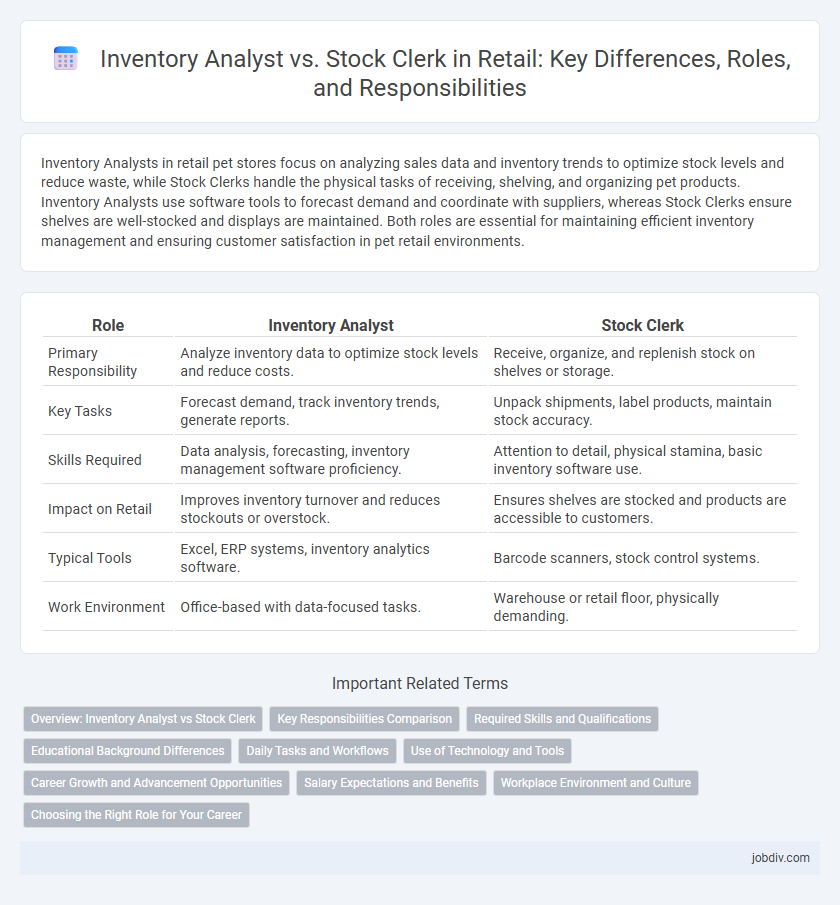Inventory Analysts in retail pet stores focus on analyzing sales data and inventory trends to optimize stock levels and reduce waste, while Stock Clerks handle the physical tasks of receiving, shelving, and organizing pet products. Inventory Analysts use software tools to forecast demand and coordinate with suppliers, whereas Stock Clerks ensure shelves are well-stocked and displays are maintained. Both roles are essential for maintaining efficient inventory management and ensuring customer satisfaction in pet retail environments.
Table of Comparison
| Role | Inventory Analyst | Stock Clerk |
|---|---|---|
| Primary Responsibility | Analyze inventory data to optimize stock levels and reduce costs. | Receive, organize, and replenish stock on shelves or storage. |
| Key Tasks | Forecast demand, track inventory trends, generate reports. | Unpack shipments, label products, maintain stock accuracy. |
| Skills Required | Data analysis, forecasting, inventory management software proficiency. | Attention to detail, physical stamina, basic inventory software use. |
| Impact on Retail | Improves inventory turnover and reduces stockouts or overstock. | Ensures shelves are stocked and products are accessible to customers. |
| Typical Tools | Excel, ERP systems, inventory analytics software. | Barcode scanners, stock control systems. |
| Work Environment | Office-based with data-focused tasks. | Warehouse or retail floor, physically demanding. |
Overview: Inventory Analyst vs Stock Clerk
An Inventory Analyst uses data analysis and forecasting tools to optimize stock levels, reduce carrying costs, and improve supply chain efficiency, leveraging software such as ERP systems and inventory management platforms. A Stock Clerk focuses on physical inventory management, including receiving, shelving, and organizing products to ensure accurate stock counts and timely replenishment on retail floors. While the Inventory Analyst drives strategic decisions based on metrics and trends, the Stock Clerk executes operational tasks critical to maintaining day-to-day inventory accuracy.
Key Responsibilities Comparison
Inventory analysts specialize in analyzing sales trends and inventory levels to optimize stock turnover and reduce carrying costs, utilizing data analytics and forecasting models. Stock clerks focus on the physical organization, receipt, and replenishment of merchandise on store shelves, ensuring accurate labeling and inventory records. Both roles are essential for efficient inventory management, with analysts driving strategic decisions and clerks handling operational execution.
Required Skills and Qualifications
Inventory Analysts require strong analytical skills, proficiency in inventory management software, and a solid understanding of supply chain processes to optimize stock levels and forecast demand accurately. Stock Clerks need attention to detail, physical stamina for handling inventory, and basic data entry skills to organize, receive, and track merchandise efficiently. Both roles benefit from knowledge of inventory control principles, but Analysts emphasize data analysis while Clerks focus on operational tasks.
Educational Background Differences
Inventory Analysts typically hold a bachelor's degree in supply chain management, business administration, or logistics, providing them with analytical skills and knowledge of inventory control systems. Stock Clerks often require a high school diploma or equivalent, with on-the-job training focusing on physical stock handling and basic inventory tracking. The educational distinction influences their roles, with Inventory Analysts performing data-driven forecasting and optimization, while Stock Clerks manage routine stocking and inventory maintenance.
Daily Tasks and Workflows
Inventory Analysts focus on monitoring stock levels, analyzing sales trends, and generating reports to optimize inventory turnover and reduce carrying costs. Stock Clerks handle the physical receipt, storage, and organization of merchandise, ensuring accurate stock counts and timely replenishment on store shelves. While Inventory Analysts use data-driven tools to forecast demand, Stock Clerks execute daily operational tasks that maintain inventory accuracy and availability.
Use of Technology and Tools
Inventory Analysts utilize advanced software like ERP systems, data analytics tools, and forecasting models to optimize stock levels and improve supply chain efficiency. Stock Clerks typically use barcode scanners, inventory management apps, and point-of-sale systems to track and organize physical products on the sales floor or in the warehouse. The Inventory Analyst's role emphasizes data-driven decision-making, while Stock Clerks focus on hands-on inventory handling and record maintenance.
Career Growth and Advancement Opportunities
Inventory Analysts often have greater career growth potential than Stock Clerks due to their role in analyzing sales data and optimizing stock levels through inventory management software. Stock Clerks typically focus on physical stock handling and organization, which offers limited advancement beyond supervisory positions. Skills in data analytics and supply chain management make Inventory Analysts more competitive for managerial roles and higher-paying opportunities in retail operations.
Salary Expectations and Benefits
Inventory analysts in retail typically earn higher salaries, with averages ranging from $55,000 to $75,000 annually, compared to stock clerks who earn between $25,000 and $35,000. Inventory analysts benefit from roles that include data analysis, reporting, and inventory optimization, often receiving bonuses and health benefits. Stock clerks primarily handle receiving, stocking, and organization with fewer benefits and limited advancement opportunities.
Workplace Environment and Culture
Inventory Analysts typically operate in office settings within retail companies, utilizing data analytics tools to optimize stock levels and supply chain efficiency, fostering a culture of precision and strategic planning. Stock Clerks work primarily on the retail floor or in warehouses, handling physical inventory management, restocking, and organization, contributing to a fast-paced, hands-on workplace environment focused on operational execution. Both roles collaborate closely to ensure accurate inventory control but differ significantly in their work environment and interaction with data versus physical merchandise.
Choosing the Right Role for Your Career
Inventory Analysts leverage data analytics and inventory management software to optimize stock levels and reduce costs, making them ideal for professionals interested in strategic decision-making in retail operations. Stock Clerks focus on hands-on tasks such as receiving, organizing, and replenishing merchandise, suited for individuals who prefer active, operational roles within store environments. Evaluating your strengths in data interpretation versus physical inventory handling will guide you in choosing the right career path in retail.
Inventory Analyst vs Stock Clerk Infographic

 jobdiv.com
jobdiv.com